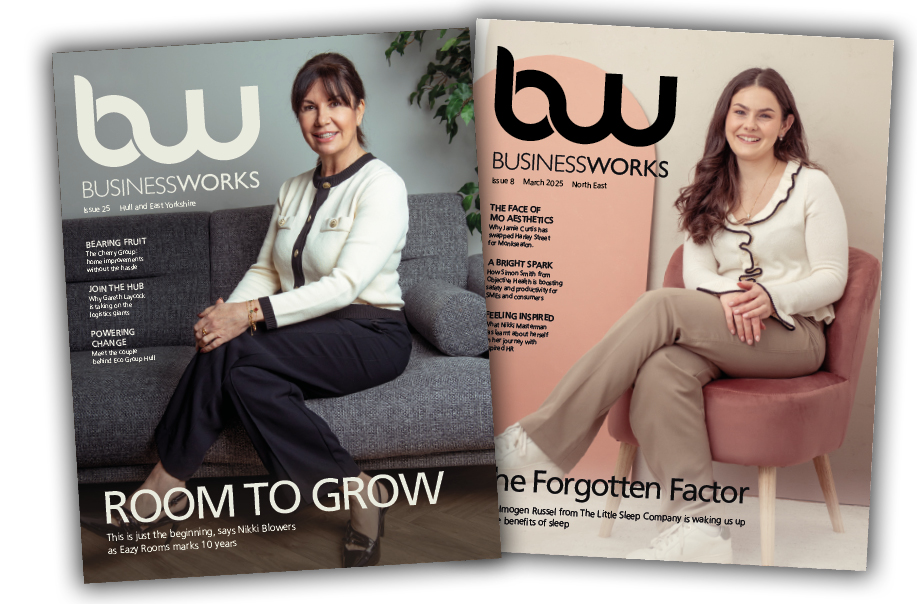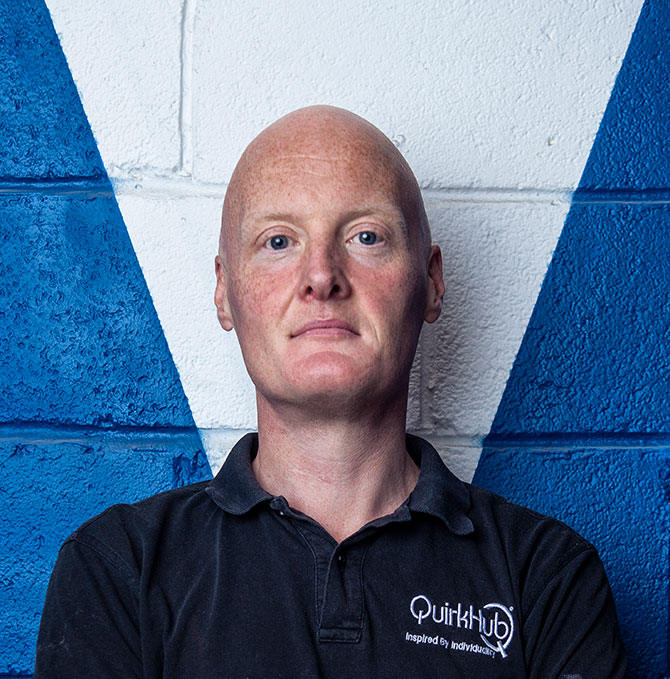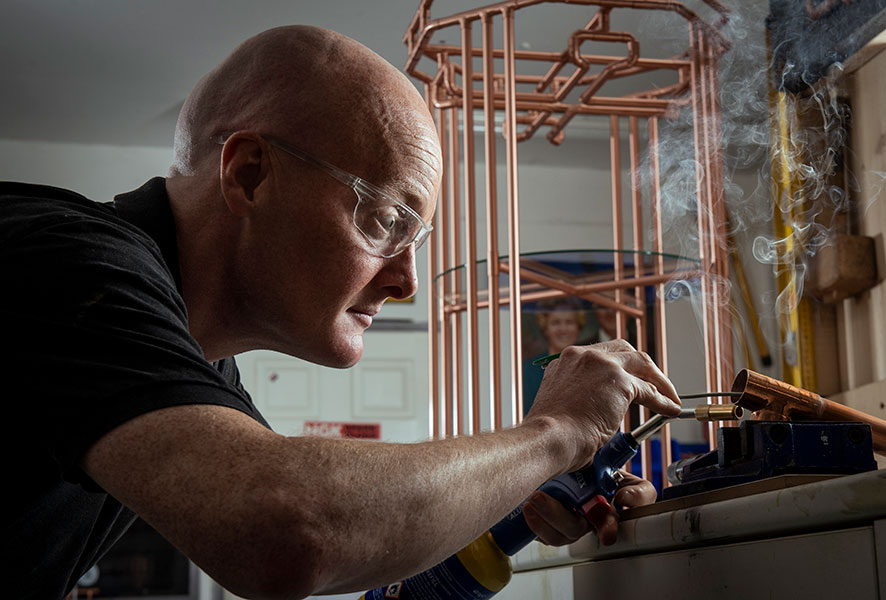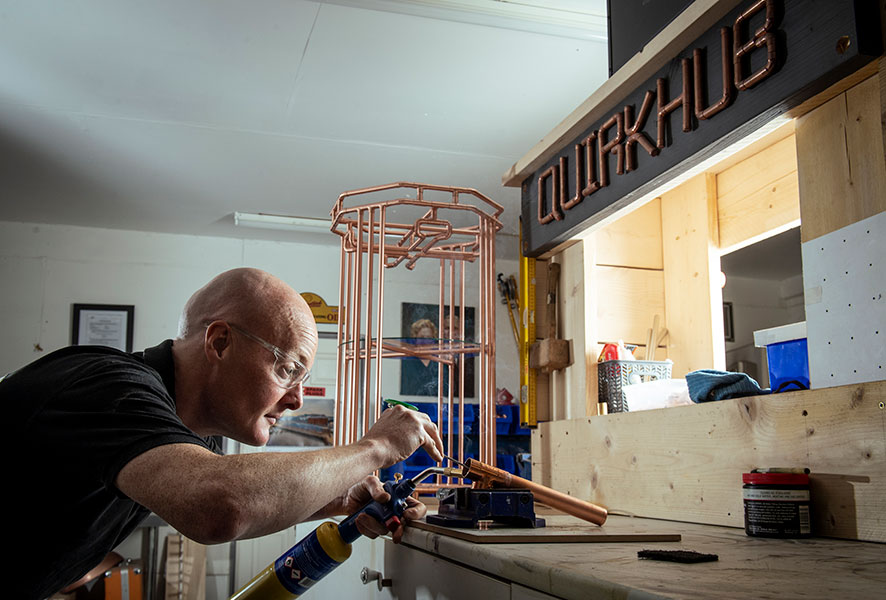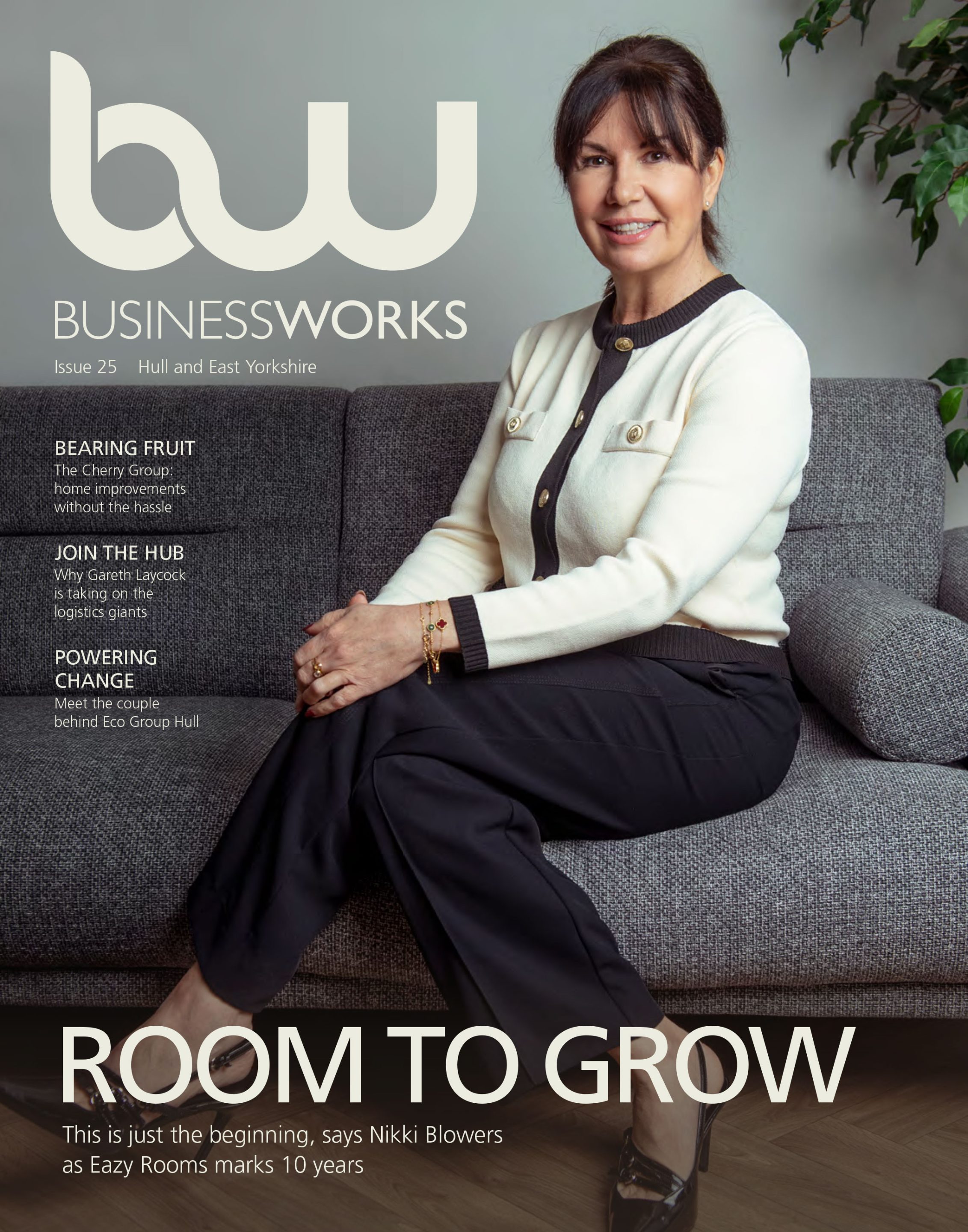Having always liked to “work with his hands” since he left school, James Walmsley became a signmaker and an engraver before backpacking around Australia for a year. After he returned, he worked for Ideal Standard in Hull for many years before, in 2015, he was forced to give up full-time work for health reasons.
A bit of “messing about” with some copper piping in his garage resulted in an original design for a kitchen door handle, and he began selling it on Etsy. This being the perfect platform for all things quirky and unique, the door handles began to sell well, and James soon had customers from all over the world. Thus QuirkHub was born – but it was still a risky way to make a living, given that he’d just left a career as an engineer; even though his wife was still working, it would be about six months before he began to turn a profit.
“I had no experience,” says James. “I can remember feeling quite nervous listing my products for the first time, asking people to give me their hard-earned money, and wondering whether they’d like them and whether they were good enough. But they obviously were. I just figured I needed to sell something that nobody else sold, as at the time there weren’t that many people making products out of copper pipe; they’re ten-a-penny nowadays!” James also understood that, coming from a background in engineering, high levels of quality were vital in longevity.
James also set up his own ecommerce website, using the Shopify platform, and did his own marketing, even photographing all his products himself. He still does this now, being very much of the opinion that if you want a job doing well, do it yourself.
It wasn’t long, though, before he realised there was only so much mileage in copper piping, so he began to branch out into furniture. “I went to a few home and furniture shows and found suppliers for other products that were quirky and different. So it’s now a mixture of products that I make and products that I buy in. Obviously it’s easier for me to buy it in and sell it rather than making it by hand, but I like to do both, so that I’m still true to the roots of how it started while trying to sell things that are a little bit different.”
Does he worry that the current cost-of-living crisis will lead to a downturn, as people shun bespoke craftsmanship and statement pieces for the bare essentials? QuirkHub is hardly Ikea, after all – and the pricing reflects the highly individual, handmade nature of the items for sale, which include everything from tables, chairs and sideboards to lighting and wall clocks. (That said, there are many handmade accessories well under the £50 mark.)
“Without a doubt,” agrees James. “One of the issues of selling products online is that you’ve got to sell it at the right price. I haven’t put any of my prices up, even though the cost of my materials has gone up, because if do, people may stop buying from me, and there’s a problem. That’s always been a delicate balance, putting the right percentage on it, and more so now as people are struggling a bit.”
After he found himself running out of space in his garage, James realised it was time to find a proper workshop – and Wincolmlee proved to be the perfect spot. This up-and-coming creative hub on the banks of the river Humber is also home to the Drunk Animal Creative Studio, construction firm Hobson and Porter, Slave to the Beat musical store, Kwiktuf glass manufacturer, and more. James knew he’d fit in well. “It’s affordable, and where I am now there are all sorts of different trades – probably every trade and profession that’s needed to run a country! It’s a real little industrial area. So it’s a good place to be in, to meet other people in trade, and when I need to borrow people’s skills, I can go and knock on their door.”
Like a lot of people who have started up their own business, James is reluctant to call himself an entrepreneur, agreeing that the word can have connotations of the super-rich Branson types. He’s also a firm believer in the need for a good work-life balance.
“Probably for a couple of years, I was out of balance, working too much,” he says, “but I think most business owners who start up need to go through maybe a period of that to find out whether they want to continue doing that or not. Some people just carry on, but I just figured there had to be a balance, because it’s not all about money and profit. I’m not greedy. I don’t want to be a millionaire or have fancy cars and a big house. I’m at a place now where I’m happy with the annual revenue and profit, and the hours I have to work. Whether you would call that lack of drive, I don’t know.”
It’s perhaps less a lack of drive than a distinct trend that has come out of the pandemic. As Elle Hunt wrote in the Guardian in July, “the age of anti-ambition” has seen many people take stock “of how they spend their time, where they find meaning, their hopes for the future – and found work wanting”. But it’s not that they’re not ambitious – just that their ambitions have been refocused away from wanting to spend every waking minute working to climb the greasy pole or feather someone else’s nest.
During the lockdowns themselves, though, James’s workload was “massive”. He says: “My revenue probably trebled. Whereas everybody was stuck at home, doing jobs around the house, I could still come to work, and it was non-stop for a couple of years. For people in my game of home décor, it was mad. I was doing six, seven days a week – so it was nice to have a rest after Covid! But it did change my outlook on things – I’m ambitious, but only to a certain point.”
James is also keenly aware that he is his business. “I’ve got quite a few friends who have got their own businesses, some very successful, and if they were incapacitated for whatever reason, their businesses would fold or take a big hit. I suppose those are the perils of being self-employed,” he acknowledges.
He does have a brother who can help out when needed, and he’s had the odd school leaver as an apprentice, but he admits that he’s often too busy to spend time training anyone else up. “I’m my own worst enemy in terms of being a stickler for doing things properly and it can be difficult to trust somebody else to do something,” he says.
It’s that old thing about working “in” the business rather than “on” it – and James knows this is something he maybe needs to address in the future. “You have to wear many hats – in fact you have to wear all the hats. I’ve got an accountant, but there’s still stuff you need to do for the VAT and corporation tax. I literally do it all myself, but it’s just trying to allocate the time to each of those areas. Sometimes certain areas suffer when I’m really busy. It would be nice to have other people to help, but it would also be expensive. Maybe that’s the next big step I need to get over – to figure out whether I want to employ people or whether I’m OK as I am.”
James, who is a member of the Guild of Master Craftsmen, hasn’t had to do much local legwork to promote QuirkHub – perhaps surprisingly, he’s done all his marketing and promotions online, using Instagram and Pinterest as the main drivers of traffic to his website. But that does come with its challenges, he says.
“Working online, you can’t really control who buys stuff from you, and it can change quite a lot for no obvious reason. After the first year of being in my unit in Wincolmlee, sales just dropped right off. That’s when I started to think that I needed to start looking at buying products in and selling it, as well as just making things by hand. I realised I needed to have an equal split of both, so that if one dropped off, I had another one to fall back on. That was a learning curve – selling products online, you’ve got to have more than one revenue stream, so if something fails to create sales, for whatever reason, you’ve got something else to bring the money in.”
As the listings on the QuirkHub website say: step aside, chrome – there’s a new boy in town…

